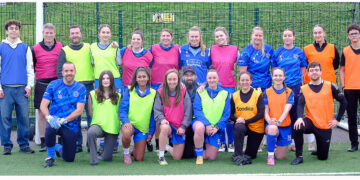A WOODLEY trainee nurse whose baby was successfully treated during a tongue-tie study is urging other mothers to take part in the NHS research.
Lauren Le-Marinel can now breastfeed her four-month-old son Theo since he underwent a procedure for tongue-tie in November.
Tongue-tie, where the skin connecting the baby’s tongue to the floor of their mouth is shorter than usual, can restrict the tongue’s movement and make it harder to breastfeed. It affects around 4-11% of newborn babies, is more common in boys than girls, and sometimes runs in families.
Theo Le-Marinel was diagnosed with tongue-tie three days after he was born at Reading’s Royal Berkshire Hospital on 3 October 2019.

The FROSTTIE study aims to find out if support for breastfeeding, or support combined with a procedure, might be more effective in helping mothers and their tongue-tied babies to successfully breastfeed.
Miss Le-Marinel, who is 22 and works at the hospital’s trauma unit, said: “At the beginning I didn’t think anything was going to help. I thought he was going to be this baby that just screamed all the time and wouldn’t take to my milk.
“I didn’t find out he was tongue-tied until after three days of being in hospital. I said that I wanted breastfeeding support and two weeks later, a research midwife contacted me about taking part in a study.
“I didn’t know what was best for him, so I just thought ‘why not?’.”
Participants of the study are randomly allocated either the support-alone group, or the support with procedure group, in order to compare the two.
Mothers are then contacted after three months to see if they are still breastfeeding.
Miss Le-Marinel was initially given weekly sessions of breastfeeding support alone, but after five weeks, Theo was still struggling to breastfeed so was then moved to the procedure group.
“He couldn’t latch on deep enough,” she said. “They initially looked at attachment, positioning and latching but he still wasn’t going on properly, despite trying different ways. I also ended up blistered and bruised and I just had to push on with it.
“Every time we went to the hospital for the clinic, it was the only time we properly went out of the house because he was just so bad. Within seconds of being in the hospital and him not moving because of the car, he was screaming.”
The procedure, known as a frenotomy or tongue-tie division, involves cutting the piece of skin connecting the underside of the tongue to the floor of the mouth.
A straightforward and almost painless surgery, it usually resolves feeding problems straight away.
As with all surgeries, the treatment carries risks, and there is not enough evidence to suggest a procedure is always necessary or if problems could be resolved with advice on breastfeeding alone.
The treatment is unnecessary if a tongue-tied baby can feed without any problems.
Fidelma Lee, research midwife and FROSTTIE Principal Investigator (PI) at the Royal Berkshire Hospital, said: “We want to find improved evidence for the best way to help mothers breastfeed when their babies have tongue-tie, as previous studies have only had small numbers of mothers and babies.
“Breastfeeding is important because it has been shown to have many benefits for the mother and baby.”
Miss Le-Marinel and her partner Sam Simmons, noticed a change in their son’s behaviour since taking part.
She said: “If it wasn’t for the study team, I would have stopped trying to breastfeed a long time ago and just bottle fed him. I’m so glad I did it and I don’t think there’s any coming back from it now.
“Now he’s happy and settled just on milk and we can go anywhere. We can actually go to town and not hide away. He’s just completely different.
“I’d definitely recommend taking part in the research. It doesn’t harm anything, you’re just there giving help to other people.”
For more information on the FROSTTIE study call 01865617919 or visit www.npeu.ox.ac.uk/frosttie












































